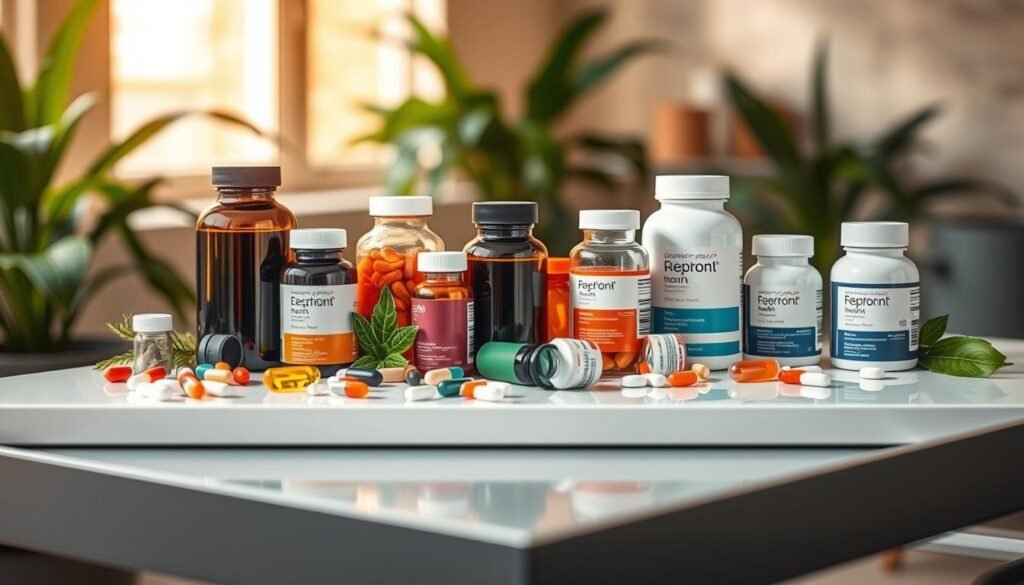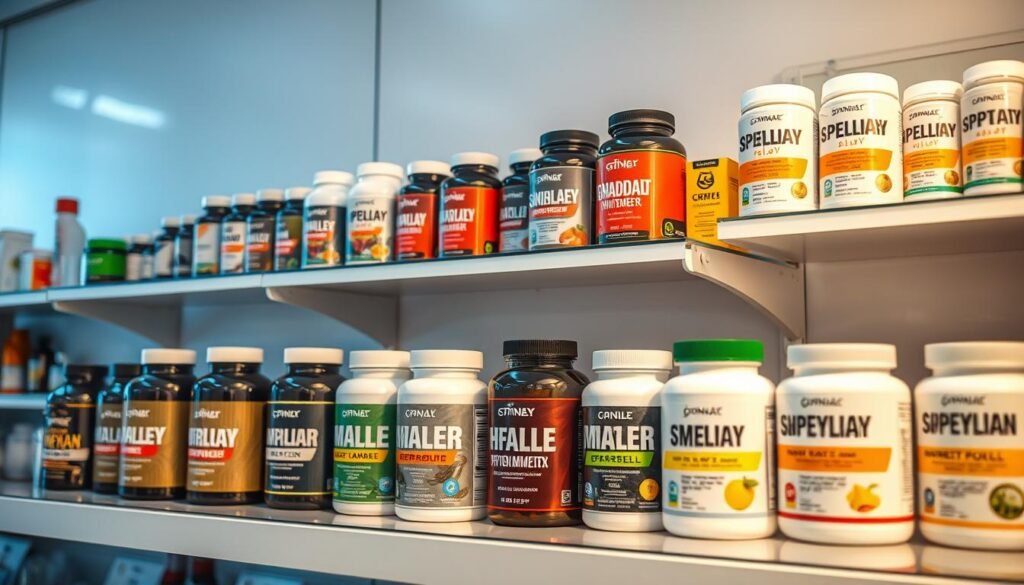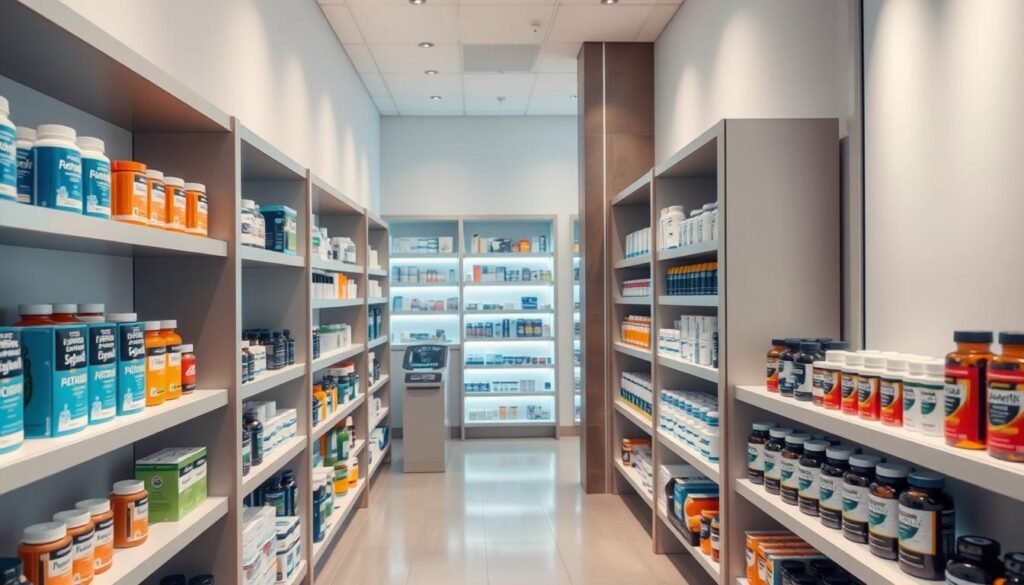Did you know about 10% to 20% of men globally face Erectile Dysfunction (ED)? This high number shows why it’s crucial to know about Medication Options for Men. Many men deal with sexual health issues. Luckily, medical science has come up with ways to help. Men can now get various treatments to boost their health and sex life.
In this article, we’ll look closely at men’s sexual health meds, including Testosterone Therapy. We will also check out Erectile Dysfunction Treatments. Knowing these options can help men stay healthy and energetic at any age.
Key Takeaways
- Understanding treatment options is crucial for men’s overall health.
- Erectile dysfunction affects a significant percentage of men worldwide.
- Testosterone therapy may play a role in addressing sexual health issues.
- Many medications are available to effectively treat erectile dysfunction.
- Access to medical support can improve treatment outcomes.
The Importance of Male Health and Wellness
Men’s health includes physical, mental, and sexual wellness. Men face unique health challenges. Low testosterone, erectile dysfunction, and mental health need attention. Age, lifestyle, genes, and environment affect male health. Knowing these helps men seek help and improve their well-being.
Understanding Unique Health Needs
Male health stats are worrying. Heart disease is a top killer of American men. Prostate cancer is also common among men. Men with large waists risk diabetes and stroke more. Smoking causes diseases like COPD. A balanced lifestyle and careful eating can cut these risks.
Men should limit alcohol to two drinks daily. Regular screenings after age 50 help catch diseases like colorectal cancer early.
Impact of Mental Health on Male Wellness
Mental health greatly affects men’s wellness. It impacts sexual health, relationships, and life quality. Depression and anxiety can lower sex drive and cause erectile problems. Mental disorders also make managing physical health hard.
It’s crucial for men to address mental wellness. A balanced health view promotes well-being. It benefits the individual, their family, and the community.
Symptoms Indicating the Need for Medication
Many men with low testosterone face both physical and emotional issues. Spotting these signs early lets them seek out treatments like Testosterone Therapy.
Recognizing Low Testosterone Signs
Low testosterone can greatly lower life quality. Signs include:
- Reduced sex drive
- Erectile dysfunction
- Loss of armpit and pubic hair
- Hot flashes
- Azoospermia (low or zero sperm count)
- Depression and difficulty concentrating
- Gynecomastia (enlarged male breast tissue)
- Decrease in muscle strength and mass
A lot of men, especially older ones, deal with these symptoms. This includes issues like obesity or diabetes. A remarkable number of men, between 40 and 70, struggle with erectile dysfunction.
The Role of Mental Health Symptoms
Mental health challenges like anxiety and depression can worsen low testosterone symptoms. Anxiety can also lead to sexual dysfunction. Men facing these issues should look for treatment that fits their needs. It might involve different approaches along with medical help. Choosing the right help is crucial for recovery.
For more on managing mental health, check out these medication options that can boost well-being.
Medication Options for Men
Knowing about Medication Options for Men is crucial. It helps address health issues unique to men. Treatments are there for low testosterone, erectile dysfunction, and prostate concerns. Let’s look into these options carefully.
Testosterone Therapy and Its Benefits
Testosterone Therapy works well for men with low testosterone. It boosts energy, mood, and sex drive, making life better. You can use gels, injections, patches, or pellets. Talking to a doctor ensures the therapy fits your health needs and lifestyle.
Common Medications for Erectile Dysfunction
Erectile dysfunction affects many men, and about 35 percent find oral meds don’t help. Treatments include PDE5 inhibitors such as sildenafil (Viagra), tadalafil (Cialis), and vardenafil (Levitra, Staxyn). These help by increasing blood flow to the penis.
For those who can’t use oral meds, there are penis implants or vacuum devices. It’s important to talk with a doctor to choose the best treatment. They will consider any side effects and how the treatment fits with your health.
Prostate Health Medications Available Today
It’s key to keep the prostate healthy, especially as men get older. Drugs for BPH or prostatitis help with peeing and reduce pain. Options like alpha-blockers and 5-alpha-reductase inhibitors are common. Regular talks with your doctor help manage prostate issues and improve your life.

Exploring Male Health Supplements
Many men now use Male Health Supplements to boost their wellbeing. These products have vitamins and minerals that are key for the body. They help with energy, immune health, and making testosterone.
Inclusion of Vitamins and Minerals
Vitamin D and B vitamins are important for men. Vitamin D helps with strong bones, and B vitamins turn food into energy. Minerals like zinc and magnesium are also crucial. They help the immune system and muscles.
These nutrients work together to improve health.
Popular Male Health Supplements on the Market
Some supplements focus on specific men’s health issues:
- Multivitamins to support heart health, cognitive function, and bone density.
- Omega-3 fatty acids for heart health and cognitive function.
- Creatine to enhance muscle strength and energy production.
- Ashwagandha, known for its stress management benefits.
Each supplement has different effects and safety profiles. It’s key to choose quality products and do research. Consulting healthcare providers before beginning supplements is wise. This helps tailor to one’s health needs for the best results.

Treatment Options for Erectile Dysfunction
Erectile dysfunction brings many challenges for men. Yet, learning about Treatment Options for Men can boost sexual health and confidence. Phosphodiesterase type-5 inhibitors stand out among treatments, gaining fame in the Erectile Dysfunction Treatments field.
Understanding PDE5 Inhibitors
PDE5 inhibitors are usually the first medication tried for erectile dysfunction. Drugs like sildenafil (Viagra), tadalafil (Cialis), vardenafil (Levitra), and avanafil (Stendra) boost blood flow to the penis when aroused. These medications help about 7 in 10 men, but those with diabetes or cancer might have lower success.
| Medication | Active Ingredient | Duration | Common Side Effects |
|---|---|---|---|
| Viagra | Sildenafil | 4–6 hours | Headaches, flushing, nasal congestion |
| Cialis | Tadalafil | Up to 36 hours | Back pain, headaches, indigestion |
| Levitra | Vardenafil | 4–5 hours | Flushing, headaches, dizziness |
| Stendra | Avanafil | 6 hours | Headaches, flushing, nausea |
If pills don’t do the trick, other treatments can help. Self-injection with Alprostadil has a high success rate of up to 85%. Vacuum erection devices are another option, helping about 75 out of 100 men.
Alternative Treatments and Lifestyle Changes
Making changes in your lifestyle can greatly improve erectile health. Exercising regularly, eating well, and stopping smoking are key steps. Managing stress also boosts your overall health, which can improve erectile function.

It’s important to talk to healthcare experts when considering treatment options. They can offer advice tailored to your specific situation. This ensures you get the most effective Erectile Dysfunction Treatments.
Hair Loss Remedies for Men: An Overview
Hair loss is a major worry for many men. It can really knock their self-confidence. Getting to know Hair Loss Remedies for Men helps them make smart choices. There are treatments like topical and oral medications working against hair loss such as male pattern baldness. Talking to a doctor can get you a plan that fits just right, looking at both good points and possible risks.
Types of Medications for Hair Regrowth
There are several medications known to help hair grow back. Here’s a quick overview of some top choices:
| Medication | Type | Time to Efficacy | Potential Side Effects |
|---|---|---|---|
| Minoxidil | Topical | 4 Months – 1 Year | Scalp redness, irritation, facial hair growth |
| Finasteride | Oral | About 4 Months | Erectile dysfunction, depression |
| Spironolactone | Hormonal | About 4 Months | Hormonal side effects, breast tenderness |
| Corticosteroids | Injectable | Varies | Scalp irritation, thinning skin |
| Antifungal Medications | Oral/Topical | 1 – 2 Months | Rash, diarrhea, upset stomach |
Minoxidil works well for different hair loss types, like male pattern loss and alopecia areata. Finasteride is great for male pattern baldness, blocking certain hormones causing hair loss. Knowing the ups and downs of Hair Loss Remedies for Men is key.
Benefits and Risks of Hair Loss Treatments
Men looking for hair loss treatments have many options yet must consider possible side effects. In many cases, the benefits are stronger than the downsides. It’s important to know these details:
- Medications like minoxidil improve blood flow to the follicles, helping hair grow.
- Oral drugs like finasteride can bring noticeable improvements fairly quickly.
- Corticosteroids are good at tackling hair loss due to autoimmune diseases.
Still, drawbacks such as scalp irritation or other issues can’t be ignored. For instance, finasteride might lead to sexual issues, and some creams can irritate the skin. Talking with a healthcare expert can help you find the best option for your specific situation. For further information, check out Hair Loss Treatments.
Andropause Treatments and Management
Andropause is a significant phase in a man’s life, happening usually in the late 40s to early 50s. It’s marked by a slow decrease in testosterone levels. This drop can cause fatigue, mood changes, and a lower sex drive. It’s crucial to recognize these symptoms to start effective treatment and boost overall health.
Understanding Andropause and Its Symptoms
Men going through andropause might face both physical and emotional symptoms. They can feel a loss of energy and changes in mood. There might also be weight gain, muscle loss, sleep problems, and trouble focusing.
- Loss of energy and enthusiasm
- Weight gain and fat redistribution
- Mood swings and irritability
- Loss of muscle mass
- Difficulty sleeping
- Poor concentration and memory issues
Testosterone dips about 1% every year after 30. This drop alone isn’t always a big problem. But, stress, depression, and other factors can make andropause symptoms worse.
Available Treatment Plans
Dealing with andropause symptoms means finding the right treatment plan. There are several options:
- Testosterone Replacement Therapy: This can be through shots or gels to balance hormone levels.
- Cognitive Behavioral Therapy (CBT): This helps with anxiety and depression.
- Exercise Programs: Working out can improve health and mood.
- Nutritional Counseling: Eating right plays a big role in health.
- Relaxation Techniques: Methods to manage stress can ease symptoms.
Getting the right diagnosis of late-onset hypogonadism is key. Blood tests for testosterone levels and symptom checks help find the best treatments. As men age, keeping up with check-ups is crucial for staying healthy.
| Treatment Option | Benefits | Considerations |
|---|---|---|
| Testosterone Replacement Therapy | Reduces symptoms of testosterone deficiency, boosts mood and energy | Potential side effects; requires monitoring |
| Cognitive Behavioral Therapy | Addresses mental health; improves coping strategies | Time commitment; gradual progress |
| Exercise Programs | Enhances physical health; improves mood and strength | Requires regular commitment; may need guidance |
| Nutritional Counseling | Supports overall health; promotes weight control | Needs individualized planning |
| Relaxation Techniques | Reduces stress and anxiety; improves sleep quality | May require practice and consistency |
Adding these treatments can lead to a healthier life and better quality of living for men in this natural aging phase.
Male Fertility Medications Explained
Understanding male fertility is key. It starts with knowing how hormones affect sperm health. Hormones impact sperm making, movement, and health. For men with fertility problems, keeping hormones balanced is vital. Male Fertility Medications help fix hormone levels. This improves chances of having a baby.
Importance of Hormonal Balance in Fertility
Hormones out of sync can hurt male fertility. Drugs like clomiphene citrate help. They fix hormone levels to boost sperm quality. Clomiphene, or Clomid, ups sperm count and movement. It does this by making the body release certain hormones. These hormones then raise testosterone, which is crucial for making healthy sperm.
Overview of Common Fertility Medications
- Clomiphene Citrate (Clomid): Raises sperm number and mobility by 4-5%. Good for men with low sperm count or poor mobility. Can make libido and energy levels better. Side effects include irritation and slight acne.
- Human Chorionic Gonadotropin (hCG): For those who don’t benefit from Clomid. It boosts testosterone and sperm count. Side effects are similar to Clomid.
- Letrozole and Anastrozole (Arimidex): Stop too much testosterone from turning into estradiol. This helps with sperm making. Side effects might be joint pain and headaches. Using them for a short time usually means fewer serious problems.
About 10% of men in the US facing conception troubles have infertility issues. Fertility meds are crucial for issues like azoospermia, seen in 15% of male infertility. With correct treatment, men can better their chances of fatherhood.
| Medication | Primary Benefits | Common Side Effects |
|---|---|---|
| Clomiphene Citrate (Clomid) | Increases sperm count and motility; enhances libido | Irritability, mild acne, tender breasts |
| hCG | Stimulates testosterone production; improves sperm quality | Similar to Clomid; can include mood changes |
| Anastrozole | Prevents estradiol formation; boosts sperm production | Joint pain, nausea, headache |
Conclusion
It’s key for men to know about the medication options available to them. This includes treatments like testosterone therapy, solutions for erectile dysfunction, and nutritional supplements. By understanding these options, men can address their health concerns in an effective way. They get to choose what works best for them.
Talking openly with healthcare providers is important. It helps men understand the options, like PDE5 inhibitors, which improve sex life for many. There’s also TENS and treatments for issues like delayed ejaculation. For instance, cabergoline looks promising, but needs more research.
Having a full picture of treatment choices helps men lead in their health decisions. Staying in touch with healthcare professionals is crucial. They help men stay informed and make smart choices about their health. For more on pharmacological treatments, check out this in-depth article.